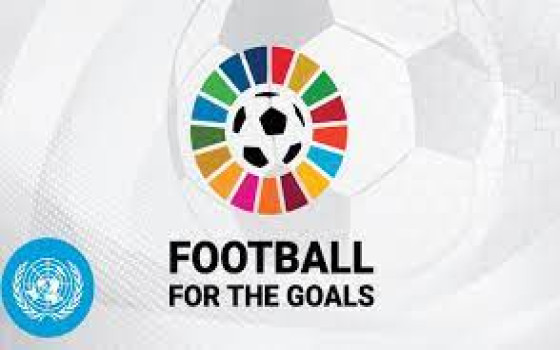On the eve of World Football Day, a UN forum mobilizes action across the Sustainable Development Goals.

- Europe and Arabs
- Thursday , 22 May 2025 6:24 AM GMT
New York: Europe and the Arabs
Ahead of World Football Day on May 25, football – which unites fans globally – linked its widespread appeal to the United Nations Sustainable Development Goals (SDGs) at an event held at UN Headquarters in New York.
The Football for SDGs Forum brought together high-level UN officials and some of the most prominent voices in the world’s most popular sport, at an event titled “Champions of Change: Football and the UN Unite for the SDGs.”
Thanks to its global reach, football is uniquely positioned to drive progress towards these goals. Launched in July 2022, the Football for SDGs initiative is a UN initiative aimed at engaging the international football community in advocacy for the SDGs. According to the UN Daily News, a copy of which was received on Thursday,
The forum, which took place yesterday, Wednesday, aimed to mobilize the football community to take action across key SDG areas – including climate action, equality, and youth empowerment.
Kick-off
The opening session included remarks from football executives, UN Spokesperson Stéphane Dujarric, UN Under-Secretary-General for Global Communications Melissa Fleming, and the Permanent Representative of Qatar to the United Nations.
The opening session, titled "Enhancing Community Engagement with the Sustainable Development Goals," discussed the origins of the Football for Goals initiative and explored how the football community can deepen its contribution to the SDGs. This was followed by a brief discussion on the football sector's commitment to climate sustainability.
Another session explored how football reflects global inequalities—between the global South and North, and between men and women—and how it can contribute to addressing these inequalities.
Event participants shared best practices for developing and implementing sustainable programs and adopted a declaration with clear commitments to expand the impact of football on sustainable development. The North-South Gap
Julia Pimenta of Street Child United noted that football organizations in the Global South, which serve children most in need of support, often lack adequate funding and must compete with well-resourced programs in the Global North.
Similarly, Sarah van Vuuren of Atout in Nepal noted that grassroots organizations that link football to sustainable development often lack the resources to reach their full potential.
Both speakers emphasized that supporting these initiatives is essential to advancing the Sustainable Development Goals related to education and reducing inequality.
Leveling the Gender Playing Field
Jayathma Wickramanayake, Policy Advisor on Sports Partnerships at UN Women, said that progress on SDG 5, on closing the gender gap, is slow and, in some regions, regressing. This is largely due to the persistence of social norms, attitudes, and behaviors. These norms are often manifested in the world of sports through unequal pay and incidents of sexual harassment, she said. However, Ms. Wickramanayake and other speakers highlighted how sport can be a powerful tool to challenge stereotypes and empower women and girls to succeed – on and off the field.
World Football Day
The United Nations has long recognized the role of sport in advancing the Sustainable Development Goals – from promoting peace, gender equality, and health to climate action – as affirmed in a General Assembly resolution on sport adopted in December 2022, designating May 25 of each year as World Football Day.
Last year, this date marked the centenary of the first international football tournament in history with representation from all regions, which was held on May 25, 1924, during the Summer Olympic Games in Paris.














No Comments Found